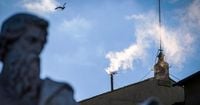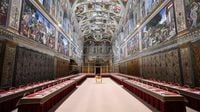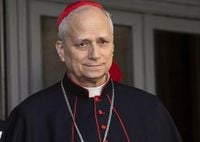In a historic moment for the Catholic Church, Cardinal Robert Prevost has been elected as the first American pope in the 2,000-year history of the institution. The announcement was made on May 8, 2025, following a conclave that lasted just over 24 hours, with Prevost taking the name Pope Leo XIV. The election took place as white smoke billowed from the chimney of the Sistine Chapel, signaling that the cardinals had reached a decision after five votes, the same number required to elect Pope Francis in 2013.
The new pope, 69, was raised in Chicago but has spent significant time in Peru, where he served as a missionary and later as the archbishop of Chiclayo. His dual citizenship—American and Peruvian—has made him a unique figure in the Church, bridging two cultures that have historically shaped Catholicism. Prevost was appointed by Pope Francis as the prefect of the Dicastery for Bishops in January 2023, a position that placed him at the heart of the Church’s leadership.
As the crowd gathered in St. Peter’s Square erupted in cheers, the new pope addressed the masses, first in Latin and then transitioning to Spanish, reflecting his long-standing ties to the Latin American community. He expressed gratitude to his predecessor, Pope Francis, who passed away on April 21, 2025, at the age of 88. The late pope was known for his progressive approach to issues such as climate change and LGBTQ+ rights, and his death left a significant void in the Church.
During his tenure, Prevost has been recognized for his role in implementing reforms, including a groundbreaking decision to add three women to the voting bloc responsible for bishop nominations. This move was seen as a step towards inclusivity within the Church, aligning with the ideals promoted by Francis. The Rev. Fidel Purisaca Vigil, who worked closely with Prevost in his previous role, noted his positive demeanor and dedication to his fellow priests, stating, "No matter how many problems he has, he maintains good humor and joy."
The conclave, which began on May 7, 2025, saw 133 cardinals participating, with approximately 39% of electors hailing from Europe. The election of an American pope had long been considered taboo due to the geopolitical implications, but Prevost's extensive experience and dual citizenship likely played a crucial role in his selection.
In the lead-up to the conclave, speculation had circulated regarding potential candidates, with many believing that Prevost was a frontrunner. His leadership within the Augustinian order and his previous roles in both Peru and Rome positioned him as a strong candidate for the papacy. However, some cardinals expressed concern over his American nationality, which has historically been viewed as a disadvantage in the context of papal elections.
Prevost's election marks a significant shift in the leadership of the Catholic Church, as he will now lead an institution that has undergone considerable transformation under Francis. The new pope is expected to continue fostering dialogue and reform, particularly in regions where the Church is experiencing rapid growth, such as Latin America.
The announcement of Prevost’s election was met with excitement from various quarters, including a congratulatory message from former President Donald Trump, who expressed his pride in having the first American pope. Trump stated, "Congratulations to Cardinal Robert Francis Prevost, who was just named Pope. It is such an honor to realize that he is the first American Pope. What excitement, and what a Great Honor for our Country. I look forward to meeting Pope Leo XIV. It will be a very meaningful moment!"
As the world watches closely, Pope Leo XIV’s papacy will be scrutinized for its approach to both traditional Catholic teachings and contemporary social issues. His leadership is anticipated to reflect the spirit of inclusivity and reform that characterized Pope Francis’ tenure, while also addressing the unique challenges faced by the Church in the modern era.
In his first official address, Pope Leo XIV emphasized unity and faith, stating, "Without fear, united, hand in hand with God and among ourselves, we go forward." His words resonated with the crowd, many of whom waved flags from their home countries and celebrated this momentous occasion.
The conclave process itself was steeped in tradition, with cardinals casting their votes in secrecy. Each cardinal writes their choice on a ballot inscribed with the words "Eligo in summen pontificem"—"I elect as supreme pontiff." The ballots are then counted, and the results are signaled by the color of smoke that emerges from the chimney of the Sistine Chapel. Black smoke indicates no election, while white smoke signifies that a new pope has been chosen.
As the Catholic Church stands at this new crossroads, the election of Pope Leo XIV represents not only a historic milestone but also a moment of hope for many believers around the globe. His leadership will be pivotal as the Church navigates the complexities of modern society while remaining rooted in its foundational beliefs.



